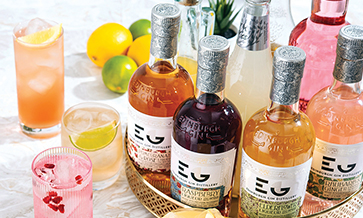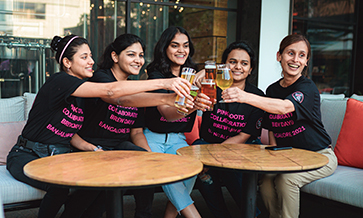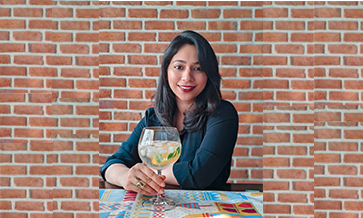The Indian alcobev industry has seen a wave of innovation across sectors, starting from Indian native spirits like Feni and Mahua to single malt whiskies, exclusive gins and craft beers. What binds an exciting set of brands in all these categories together is Goa; and what immediately springs to mind is ‘How?’ and ‘Why?’
Feni means froth in Konkani, and the name is said to have originated somewhere between 1584 and the 1750s, with its first mention in the 1750s when the Portuguese started taxing it. The Arabs are believed to have introduced the cashew fruit to Goa, and 1584 is believed to have seen the first mention of a spirit called Nasha Pani.
Distilling of cashew fruit pulp started during Portuguese rule and the colonisers allowed it to flourish while also putting in place a set of rules, which very much focused on the small scale and artisanal nature of production – a trend which the world has now begun discovering and valuing.
There were, of course, some oddities in the rules, which have persisted to this day. For example, even though you may have a plot of land where cashew trees grow, you still have to put in a bid for that cashew every year – if someone else wins the auctioned lot, s/he can pick the fruit!
Even after that there is a catch – there is a separate auction for those who wish to distil the pulp of the flavoured fruit! After the liberation of Goa in 1961, Feni was left to follow the same old laws.
However, since it didn’t quite fit in as an IMFL (India made foreign liquor), it was included under the classification of ‘country liquor’. This classification helps keep the prices of Feni low, and well within the reach of the common man who drank it.
But the law also prevents its export to other states – and hence a lack of awareness about Feni and low social esteem.
Going premium
That is where producers like Hansel Vaz and Regan Henriques, of Cazulo Feni and Rhea Distilleries respectively, have stepped in. At the age of 26, Hansel turned away from his job in a multi-national in the South Pacific, to return home and resurrect his family’s Feni business.
After years of hard work Hansel launched Cazulo (the Konkani word for firefly) Feni in 2012; but his product was priced at thrice as much as other brands of Feni. But due to the Vaz family’s long history in the liquor retail sector, it soon caught on and found eager buyers.
My early memories of drinking Feni are not pleasant; but when I drank Cazulo for the first time in 2015, I found that Hansel had struck the right balance between aroma and taste, which give Feni its distinctive markers. Both have been gently toned down, helping Feni find new fans.
Hansel also invested in his brand to ensure that people would be proud to pull out a bottle of Cazulo at home, or order it in a trendy bar. (See our photo-feature in Brews&Spirits of Aug-Sept, 2019)
Another distiller who is doing his best to change the adverse perception of Feni is Regan Henriques of Rhea Distilleries, who has produced three interesting variants, two of which I’ve tasted a couple of years ago.
“Normally, cashew Feni is distilled twice, but Fidalgo premium is distilled a third time, enabling us to achieve an ultra-fine Feni,” Reagan informs me.
Matured in oak
Fidalgo also enjoys premium pricing (Rs. 500), befitting its silver medal at the prestigious San Francisco World Spirits competition (2016) and another silver in the white spirits category at the International Wine and Spirits Challenge in London in 2017-18.
Traditionally Feni has been rested or matured in garrafão (large glass jars). Regan decided to experiment with maturing Feni in oak casks for several years, which increased the expense due to their scarcity and cost. But he found that this led to a remarkable transformation in the flavour, with the Feni gaining complexity and depth, with appealing aromas and a warm amber colour.
This resulted in a brand that he called Rhea Heritage. Regan uses American oak casks, which have previously been used for bourbon. The Feni is aged for a minimum of 3 years and Rhea Heritage is priced at Rs. 750.
Regan also chose triple distilled Feni for infusion with fresh cinnamon from Sri Lanka and honey from Kerala. He lets the flavours marry for three months before bottling it as Rhea Harmony (Rs. 650/). A smooth blend, Regan advocates its consumption either on the rocks, or chilled with ice and soda, or even possibly as a chilled shot.
Savoury gins
Over the last few years premium gin has begun to take off in India, but the brands / variety on offer were not to the liking of Anand Virmani and Vaibhav Singh, co-founders of Perch, a wine, coffee and cocktail bar, with two outposts in Delhi.
Instead of complaining about it, they decided to create their own gin label and thus was born Nao Spirits, which they chose to set up in Goa. Anand says, partly in jest, “It gives me a good reason to visit Goa!”
Jokes aside, what was also of appeal was that they could tap into shared infrastructure, and avail of the facilities offered by Blue Ocean Beverages located in a dusty industrial estate in Sao Jose de Areal, south of Margao.
I visited there earlier this year. Tucked away in a corner of the massive facility is Agotha, the copper pot still from Hungary, used to make both, Greater Than, their entry level gin, as well as Hapusa, their premium variant. (See Agotha in Brews&Spirits of June-July, 2019).
Greater Than, their first brand, owes its name to the mathematical precision of a cocktail recipe. With Greater Than in the mix, it would elevate the recipe and make it greater than the sum of its components.
Greater Than is a classic London dry gin, perfect for a G&T or other classic cocktails. Hapusa, their second brand, is the world’s first Himalayan dry gin, comes in a beautiful bottle and has foraged Himalayan juniper and locally sourced botanicals.
Hapusa is a savoury gin, for which we have also turmeric and mango to credit, and is a great gin to just sip over ice or, if you like, in a Classic dry martini.
New standards
Goa is home to another Indian craft gin, this one from Third Eye Distilling, a brand called Stranger & Sons. Fularton Distilleries, with which Third Eye Distilling shares manufacturing space, is a large integrated alco-bev facility.
The logo of Stranger & Sons is a tigress and no ordinary one – a two-tailed, 3-eyed animal. The gin has a vivid mix of Indian botanicals, starting with the Gondhoraj lemon and also including liquorice, nutmeg, cassia bark and mace. (Read more about Stranger & Sons in Brews&Spirits of Aug-Sept, 2019).
For Sakshi Saigal, CEO of Stranger and Sons, “Goa was a natural choice as it is both the traditional seat of alcohol trade in India (since Portuguese times) and a key player in India’s spice trade.”
Fullarton Distilleries produces Woodburns, a contemporary Indian whisky, which also has a pretty neat packaging, something to also look out for on your next trip. It is a blended whisky, with a high percentage of malt (all locally sourced), priced at Rs. 2,850 in Mumbai and Rs. 1,500 in Goa.
Hapusa, Stranger & Sons and Woodburns have set new standards for Indian packaging. Aman Thadani of Fullarton tells me he is planning to launch his own brand of gin in 2020.
Paul John single malt whisky is now also firmly on the spirits tourism map with an exquisite visitor experience centre built in traditional Goan architecture. It has a full team of experts on hand to guide visitors through the whisky making process.
The barley malt is sourced from the plains of northern India. The spirit which emerges from the pot stills has no colour and little flavour, but its quality is of paramount importance. It is matured in ex-bourbon casks from Kentucky, oak casks from Limousin (France), sherry butts from Spain and port pipes from Portugal.
Apart from the newly launched Nirvana, the distillery’s flagships are Brilliance, Edited and Bold. Two other whiskies are available only in Goa due to their high (55% ABV) alcohol content, the Select Cask-Classic and the Peated.
Beer bouquet
As a frequent traveller to Goa, one brand I always looked forward to was Kings Beer, served in its stubby bottle. It was with sadness that I realised that this was one constant I would no longer enjoy. Fortunately for me, a string of entrepreneurs afford me enough choices in both, packaged beer (bottles/cans) or fresh beer from a tap.
Suraj Shenai had his first taste of an IPA (India Pale Ale) while on a flight to the US and he was hooked. With no experience of beer, apart from mass market lagers in India, this was an eye opener. He spent the next few weeks touring breweries up and down the coasts of America.
He got on board as a co-founder, Ashtavinayak Paradh (aka Ash), a doctorate in brewing sciences from Scotland’s prestigious Heriot-Watt University, who was associated with Pune’s Vasantdada Sugar Institute. Suraj finally set up Goa Brewing Company in a large derelict villa in Sangolda (across the Mandovi River from Panaji), to set up his brewery.
Ash and his team of young brewers, most of who have studied under him at VSI, churn out Eight-Finger Eddie, a fruit-forward and hoppy IPA. A pineapple Saison is their second commercial launch, and their most recent one is an ale called Saints and Sinners – in a blue bottle with a red seal!
My next stop is just a short distance away in Saligao, where Bengaluru-based Arbor Brewing Company supplies beer in kegs across bars in Goa as also make three of their beers available in cans in a Beer Garden that also offers superlative food and service.
Helping hands
While Greater Than and Hapusa are housed in Blue Ocean Beverages (south of Margao), Stranger & Sons works out of Fullarton Distilleries (at the base of the Western Ghats in Khandepar). Both of these are large facilities which, apart from producing their own set of brands, also provide entrepreneurs with both the space for production and access to expensive facilities like bottling lines and storage tanks.
Mrinal Manu of Blue Ocean does not yet have his own brands, but currently manufactures and exports a range of brands under license from different companies, including the US-based Hartford Eastern Holdings. Blue Ocean also has plans to launch its own products, staying within the craft spirits and liqueurs space.
Aman (Fullarton) and Mrinal (Blue Ocean) are both old hands in Goa and both give credit to the local population as a contributory factor for more and more brands choosing Goa as a base. “Although small, the population is discerning, has a good palate, is well versed with spirits and is open to new ideas,” says Mrinal.
As Anand of Nao Spirits says, “The Blue Ocean guys understood the meaning of craft and were curious enough about what we were doing. We couldn’t have managed without their support for sure.”
Mrinal also supports Desmondji, India’s first home grown agave spirits and Mahua brand which (although manufactured in Andhra Pradesh) also makes select use of Mrinal’s facilities, including the bottling lines.
Mrinal says he is very happy to work with people like Anand and Desmond Nazareth of Agave India. “They are trying to differentiate the industry,” he notes.
There’s more to the Goa story than inspiration and sweat. Sakshi of Stranger & Sons notes, “People here are very serious about their susegad time: they will shut shop and leave, no matter how pressing your work. It took us some time to get used to it, but you can’t really complain about a 4-hour work day!”














